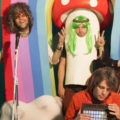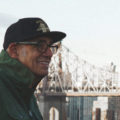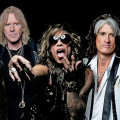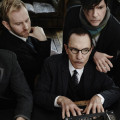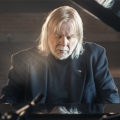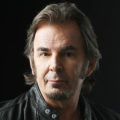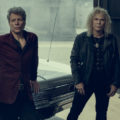After more than two decades, Kelly Nickels pulls the trigger on his return to L.A. Guns for “Renegades”
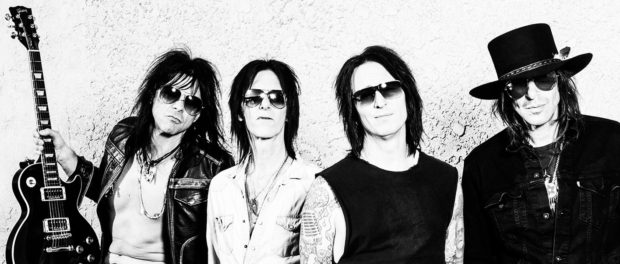 Photos provided by Golden Robot Records
Photos provided by Golden Robot Records
Running right alongside the eventually enormous likes of Guns N’ Roses, Motley Crue and Poison on the Sunset Strip, L.A. Guns were cocked, loaded and ready to aim at the entire world with a no-frills firing squad of hard rock and heavy metal.
The group racked up one gold or platinum album after the next, becoming a constant presence on MTV, all while touring with a ton of heavyweights, such as AC/DC, Iron Maiden and Def Leppard.
Bassist and occasional singer Kelly Nickels was there from the very beginning until grunge temporarily took over, and after a more than two-decade absence, he’s finally back with fellow veteran Steve Riley (drums), plus relative newcomers Scotty Griffin (lead guitar) and Kurt Frohlich (lead vocals/rhythm guitar).
In a phone call just prior to the release of this line-up’s debut long-player, “Renegades,” Chicago Concert Reviews asked all about his return to the retooled band, the wild ride to the top during the days of million dollar budgets and what’s preventing an entire L.A. Guns reunion.
 Was this album written and recorded virtually during lockdown or did everyone have a chance to get together?
Was this album written and recorded virtually during lockdown or did everyone have a chance to get together?
Kelly Nickels: The writing process was all done sending files back and forth to each other, but we did go to a studio in Los Angeles almost a year ago. We had seven days to record, two days to mix it and one day to master it, so we did a lot of homework for that and tried to get all the songs ironed out. We knew we had a budget for about ten songs, so that’s what we aimed for and everybody contributed…
It was supposed to come out in May, but we wanted to do vinyl and CDs as well. We couldn’t get those made because the companies that make those were closed due to the virus too, so everything had to be pushed back. That’s why we put out a bunch of singles up to now.
What type of statement would you like to make with the “Renegades” title?
Nickels: [Laughs] Oh man, looking for trouble. Well, “Renegades” man, we’re doing our own thing, you know? We got offered this whole thing and it was put together by people who liked the band and our management. We ended up doing a show at M3 [Rock Festival] and we ended up getting a record deal [with Golden Robot Records] from that. Now we have an album coming out, so we’re just doing our own thing.
The results sound like L.A. Guns, but also very current. Did you intentionally go for a fresh perspective instead of a throwback or is that just how it came out?
Nickels: I think that we tried to stay true to who we are, but we do have different members, so it’s definitely [fresh]. It’s a bit of the past with Steve and I, but with an updated sound with Kurt and Scott. There’s no way it could be totally the same, but we tried to stay true to what we were, a hard rock band with nothing fancy. We’re not gonna become a death metal band. We didn’t want to change the whole vibe of our history. We tried to just keep it rockin’ and make it a high energy record.
Could you talk a bit about the album artwork and if it’s a nod to the cover of the group’s debut?
 Nickels: You’re very perceptive man. When I joined the band, the first thing I did was I redid the logo for us so we could have our own identity and people would start to familiarize with that logo. “Now that is this version of the band.” Putting down the first record that we’re doing is kind of like “yeah, our first album,” so it is subtly geared towards that idea. You put your logo on your first album, so yeah, you caught it.
Nickels: You’re very perceptive man. When I joined the band, the first thing I did was I redid the logo for us so we could have our own identity and people would start to familiarize with that logo. “Now that is this version of the band.” Putting down the first record that we’re doing is kind of like “yeah, our first album,” so it is subtly geared towards that idea. You put your logo on your first album, so yeah, you caught it.
What brought you back to the band after so many years away?
Nickels: My youngest daughter was going to college, so I felt like I’d have some time now to go out and do a few shows or something. I had talked with [longtime singer] Phil [Lewis] and they were getting together [as L.A. Guns with original lead guitarist Tracii Guns, plus new bassist Johnny Martin, rhythm guitarist Ace Von Johnson and drummer Scot Coogan]. I asked him if he thought it would be a good idea if I came back and he didn’t [laughs]. So shortly after that, probably a few weeks after that, Steve Riley called me and told me that the other version was asked to play M3 and turned it down, so the guys who own M3 told Steve “why don’t you put a band together with some of the other cats that were in the band throughout the years, and just do a version of L.A. Guns, and just come play some songs?” So he called me and that’s pretty much how it started. We talked about the possibility of it for a few hours, what we would do, how we would do it, if it was really feasible and if we could do it right. We had to find two other people, which we luckily found right away, and it worked out great. It just all fell into place. The timing was right.
Would there be any way to get all the L.A. Guns back together?
Nickels: I don’t know if that’s possible unfortunately. As far as I’m concerned, I would consider it, but I think that too many bad, hurtful things have been said, so I don’t personally foresee it happening in the future. It’s a shame, but it’s kind of the way it is right now.
Walk us through the Sunset Strip scene back when the group was getting off the ground.
Nickels: That was a great scene. There was a lot of energy. Bands were getting signed, so everybody was trying to find a spot into a good band and trying to make it out of there. The scene was definitely a scene. Fashion and music was all hand in hand. It was a different world from the problems we have today. It was good time to be there because there’s not really scenes coming out any more. Music doesn’t come from a vibe or an area and that’s what was cool back then. You had scenes and were so glad to be a part of one.
What was climbing the ladder like for you?
Nickels: Man, it was just one long party. Just trying to do the best you can, making sure that the live shows were always good, doing every interview you have to, signing every autograph and trying to be nice to people. I enjoyed the whole thing. I had fun meeting people and hearing stories of how they got there. They stole their mom’s car to come to the show and stuff like that. I just enjoyed the whole experience. When Steve called me a couple years ago asking me to do this, I was like “yeah man, I’d love to be able to go back out there and play, travel, have some fun, meet cool people and hear some stories.” It was great.
Do you have any stories that come to mind from your shows or stops in Chicago?
 Nickels: We love Chicago. It’s always great to go there. I remember playing the Vic Theatre a bunch of times and it was a madhouse. I always had a good time walking around the city with [previous rhythm guitarist] Mick [Cripps]. We used to go photograph stuff during the day, eat well and drink well.
Nickels: We love Chicago. It’s always great to go there. I remember playing the Vic Theatre a bunch of times and it was a madhouse. I always had a good time walking around the city with [previous rhythm guitarist] Mick [Cripps]. We used to go photograph stuff during the day, eat well and drink well.
Tell us about some of the major tours that L.A. Guns went on.
Nickels: Yeah, those were just great man. I think we were on tour with Ted Nugent, which we were already really happy with in the first place, and then we got the call that we were gonna do some shows with AC/DC, so that was an incredible experience. We had [AC/DC rhythm guitarist] Malcolm Young in a shopping cart one time. We were racing down the street outside the hotel with them. Just super nice people. They had a bar underneath the stage with a crew guy making drinks and pouring shots while [AC/DC lead guitarist] Angus [Young] was doing his solo. They’re just legends and it was an amazing experience. We played with Cheap Trick, and Def Leppard, and they were just amazing too. It was always a pleasure to be able to play with those people and share the stage every night with people that you like. I saw AC/DC with Bon Scott at Madison Square Garden with Ted Nugent opening up, so to be opening up for AC/DC at MSG later on was amazing.
In your opinion, what’s been the most noticeable music business change between those days and now?
Nickels: Gone are the huge budgets that we used to get to go do a record of half-a-million to a million bucks. Now you’ve got a fraction of that and you’ve got seven days. We easily spent three or four months of pre-production just writing songs, and jamming, and going to the studio for another couple of months. We went to 14 different studios one time to do one of the records [laughs]…Every day we were at a different studio.
Sometimes when an album is overproduced, it loses some of the edge. “Renegades” sounds real lean, raw and alive. Your thoughts?
Nickels: Yeah, thanks, I agree. There’s no time for dilly dallying around. Everybody had work to do, to get in there and to know your part. There’s always somebody who needed to be there to make sure we all got it right…I’m pretty satisfied having a chance to do this again. It’s been like 25, 26 years since I did a record, so being able to go back in and do that with a good bunch of people, a great engineer, and the owners of the studio, Stagg Street Studio, was super cool. It was just such a positive experience. I can’t stress that enough. It’s just rock and roll, but it was fun for us to do and I hope people will dig it.
For additional information on L.A. Guns, visit LAGuns.net.

